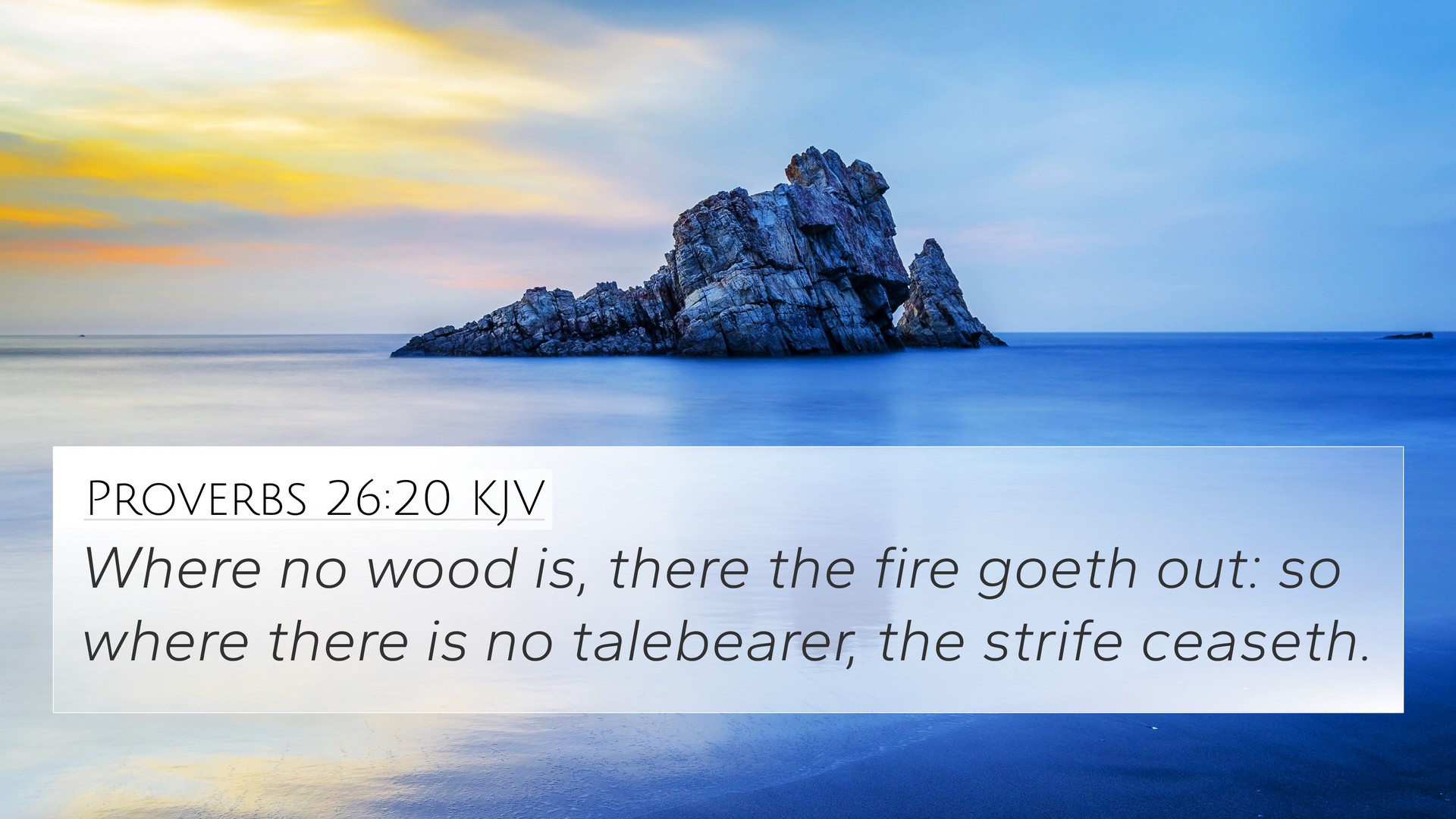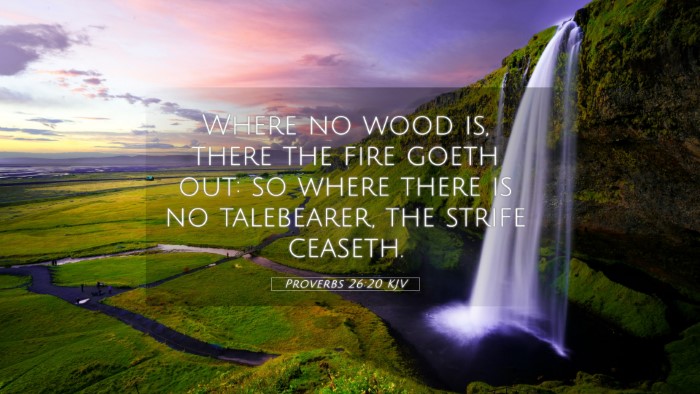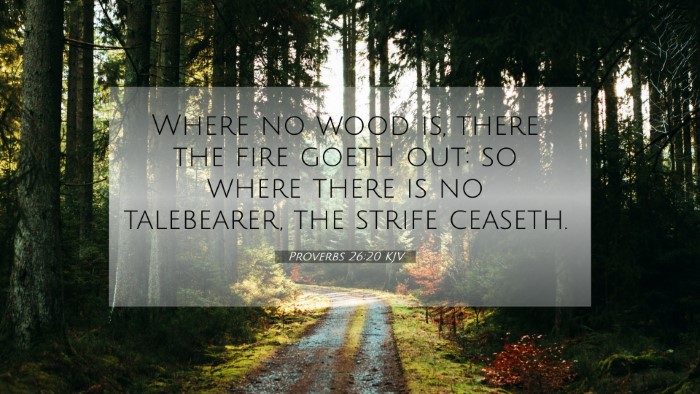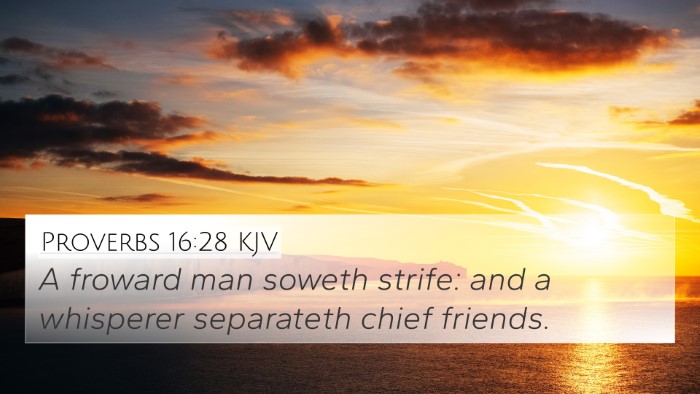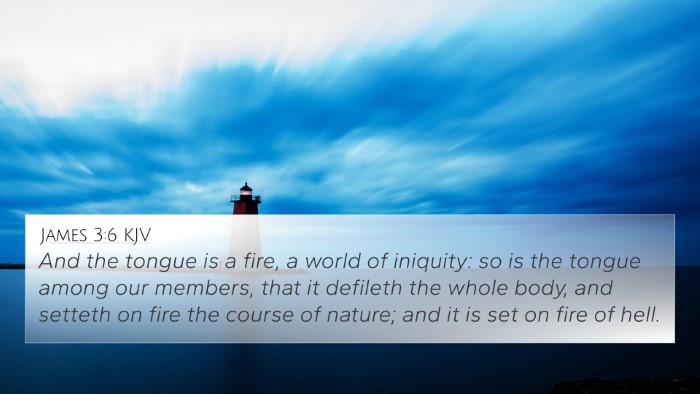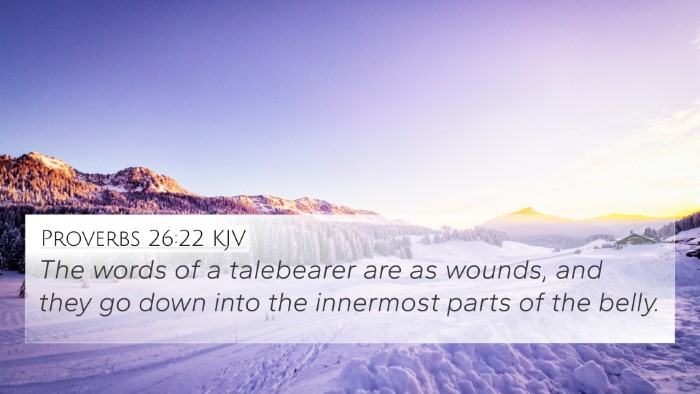Understanding Proverbs 26:20
Proverbs 26:20 states: "Where there is no wood, the fire goes out; and where there is no talebearer, strife ceases." This verse presents a profound metaphor that holds significance in the realm of interpersonal relationships and community dynamics.
Summary of Insights from Commentaries
The essence of this proverb is to illuminate the connection between communication and conflict. Respectively synthesizing the insights from Matthew Henry, Albert Barnes, and Adam Clarke can provide a clearer understanding.
Matthew Henry's Commentary
Henry emphasizes the idea that just as a fire needs fuel to continue burning, so do conflicts require "wood" in the form of gossip, accusations, or slander. Without the presence of a talebearer—the one who spreads contention—arguments and disputes will extinguish. He suggests that gossip is often unnecessary and destructive, reinforcing the need for wisdom in communication.
Albert Barnes' Commentary
Barnes presents that the phrase "where there is no wood" signifies a lack of fuel for strife. He elaborates on the characteristics of a talebearer and how they incite discord among people. He implies that avoiding gossipers can be crucial for maintaining peace. Additionally, he discusses the broader implications of unnecessary words leading to misunderstandings and quarrels, suggesting a proactive approach to peacekeeping by avoiding negative conversations.
Adam Clarke's Commentary
Clarke expands on the metaphor by pointing out that any type of disputation can be quashed by eliminating its fuel—specifically, the malcontents and tailbearers. He notes the intricacies of human relationships and emphasizes the significance of individual accountability in fostering tranquility. Clarke showcases the universal truth that wisdom in speech can profoundly render society more harmonious.
Related Bible Verses
This verse can be linked to various other teachings in the Bible that reflect similar themes, providing deeper insight through cross-referencing Biblical texts. Here are some notable connections:
- James 3:5-6: "So also the tongue is a small member, yet it boasts of great things. How great a forest is set ablaze by such a small fire!" - Revealing the destructive potential of words.
- Titus 3:2: "To speak evil of no one, to avoid quarreling, to be gentle, and to show perfect courtesy toward all people." - Stressing the importance of peaceable communication.
- Proverbs 20:3: "It is an honor for a man to keep aloof from strife, but every fool will be quarreling." - Promoting wisdom over foolish contention.
- Proverbs 17:14: "The beginning of strife is like letting out water, so quit before the quarrel breaks out." - Advising preemptive measures against conflict.
- Proverbs 15:1: "A soft answer turns away wrath, but a harsh word stirs up anger." - The impact of gentle communication on conflict resolution.
- Matthew 5:9: "Blessed are the peacemakers, for they shall be called sons of God." - Highlighting the virtue of promoting peace.
- Ephesians 4:29: "Let no corrupting talk come out of your mouths, but only such as is good for building up..." - Advocating for constructive speech.
Thematic Connections
The themes present in Proverbs 26:20 resonate throughout the scriptures, showcasing the importance of communication and the power of words. Here is a summary of some thematic Bible verse connections:
- Communication and Conflict: Scriptures on how our words can lead to either harmony or discord.
- The Wisdom of Silence: Verses that advocate wisdom in speech and the benefits of remaining silent.
- Peacemaking: Emphasizing the role of peacemakers and the blessings associated with maintaining peace.
Application for Today
Applying the lesson from Proverbs 26:20 involves being mindful of our conversations and interactions with others. It encourages us to:
- Seek peace in our discussions.
- Avoid engaging with those who spread discord.
- Choose words that promote understanding and harmony.
- Practice active listening to reduce misunderstandings.
Conclusion
Proverbs 26:20 serves as a vital reminder of the influence our words can have on the relationships within our communities. By grasping the collective wisdom of historical commentaries and the connections between various Biblical texts—such as those found in tools for Bible cross-referencing—we can enhance our understanding and application of scripture in our daily lives.
